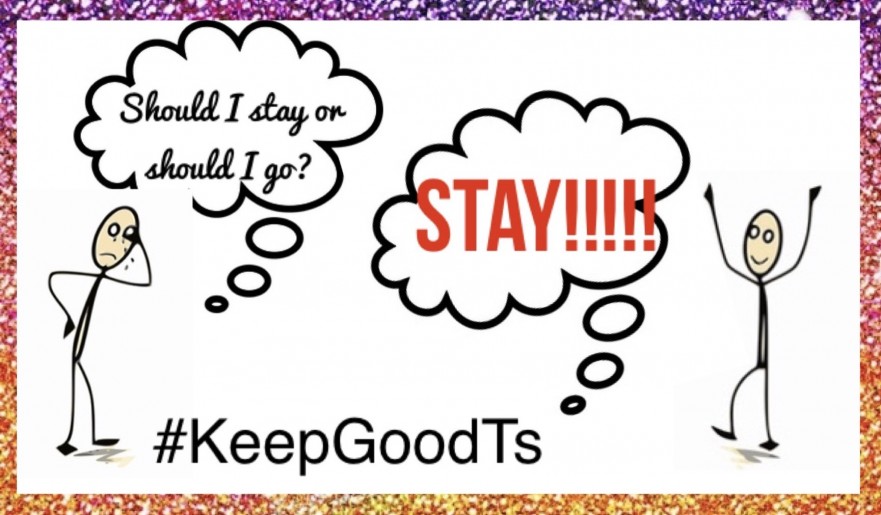Do you ever get that sense that you can make a big difference in one conversation? Two weeks ago, I bumped into a therapist who works at multiple campuses. We were talking about a different school where one of my preschool students will attend kindergarten next year. The therapist talked about an amazing kindergarten teacher who would be excellent for my student. But she interrupted her praise multiple times to say “I just hope she stays next year.” The third time she said it, I asked her, “Does she know how much you want her to stay?” She assured me the teacher knew, but didn’t cite any specific examples. I ended up saying something like, “Well, I hope she stays, too.”
The conversation kept nagging at me later. The more I thought about it, the more it bothered me. Do we all just sit around and hope other teachers sign their contracts for next year? It feels pretty powerless. What else can we do to retain each other? Have we all told our favorite colleagues how much we appreciate and respect them? Have we asked our favorite colleagues to STAY?!?
Unfortunately, most research about teacher retention focuses on what administrators and organizations can do. This limits the role that non-administrators can play in teacher retention. What can fellow colleagues, parents, students, and other community members do? How can we all work together to show some love to our favorite teachers?
I’ve posted this question on Twitter in various ways over the past two weeks to gather ideas under the hashtag #KeepGoodTs. I looked through all the responses and noticed they sorted well into the 5 Love Languages work of Gary Chapman. (He has a workplace spinoff called “Appreciation at Work” with the same concepts.) Here are some ways you can retain great colleagues in your local context, in the words of educators on Twitter:
Words of Affirmation
- “This semester I have delivered a hand written note to every person in my building. Almost everyone has said, ‘I really needed that. Thank you sooo much!'” -Susan Collins (@AZ_SusanC)
- “For those who go into other classrooms, it is important to tell teachers what makes them great. I don’t think teachers get enough feedback since evaluators are so bogged down with other tasks these days. It doesn’t take long to say ‘That was cool!’ and those moments retain teachers!” -Jess Ledbetter (@JLedTeach)
- “Another way to #KeepGoodTs is to encourage them deliberately if they have a tough class, student, or parent. My first year, someone told me, ‘These challenges are not about you. This is one of the hardest classes I’ve seen.’ Those words kept me in the profession.” -Jess Ledbetter (@JLedTeach)
Acts of Service
- “I recently told a teacher friend I would come over after school and help her do paperwork!” -Brett Bigham (@2014ORTOY)
- “I once offered to babysit twins for a teacher so he could go to an event with his wife and have her support.” -Brett Bigham (@2014ORTOY)
Gifts (Sharing Resources and Opportunities)
- “I know that in my school there are a lot of interns and student teachers. When a teacher really likes their student teacher, they keep them informed of new openings and the principal is pretty good about encouraging them as well.” -Amethyst Hinton Sainz (@mshintonsainz)
- “I buddied up with a 1st yr teacher this year. They were going to teach Ancient Egypt. I had a box of stuff, but I put out a cry for help on Twitter and was given so many great ideas, links, and a couple of really special teachers emailed curriculum to him!” -Brett Bigham (@2014ORTOY)
Quality Time
- “A safe partnership/collaboration is critical. I know if I need to vent, I can do so with no judgment, and my colleagues can do the same in turn. THEN we tackle the crux of the issue together.” -Tracey Johnson (@traceyj_az)
- A good mentor program that allows the mentor and mentee to customize the experience because the mentor is experienced and ready!” -Elizabeth Schley (@e2schley)
- “I think support is a huge thing. Even the best teacher appreciates being asked what they could use or if they need anything. So many times I think it’s assumed that good teachers have it all together and sometimes they’re the ones who need a little help the most…When someone asks, it not only shows they care but it opens the door for that conversation for them to ask for what they really need.” -Audra Damron (@audra_damron)
- “Get out of your silo! Let coworkers know that they’re not alone.” -Melissa Girmscheid (@MrsGPhysics)
I know there are probably many other tips out there that have been muted by the #COVID19 outbreak. I hope you will share yours below! I was interested that no one mentioned anything about physical touch. Perhaps that’s based on the specific people who took the time to respond–or a reflection of the appropriate caution needed in the workplace. Still, I think that high fives, smiles, and shoulder hugs could be appropriate between supportive colleagues at the right time in a mutually comfortable situation. What other ideas do you think would #KeepGoodTs in your workplace? Let’s retain each other!
If you are a parent, student, administrator, governing board member, or other individual in the community, how can you reach out to your favorite teachers right now to encourage them to stay in the profession? It’s contract time! Don’t delay. We really are #BetterTogether.









